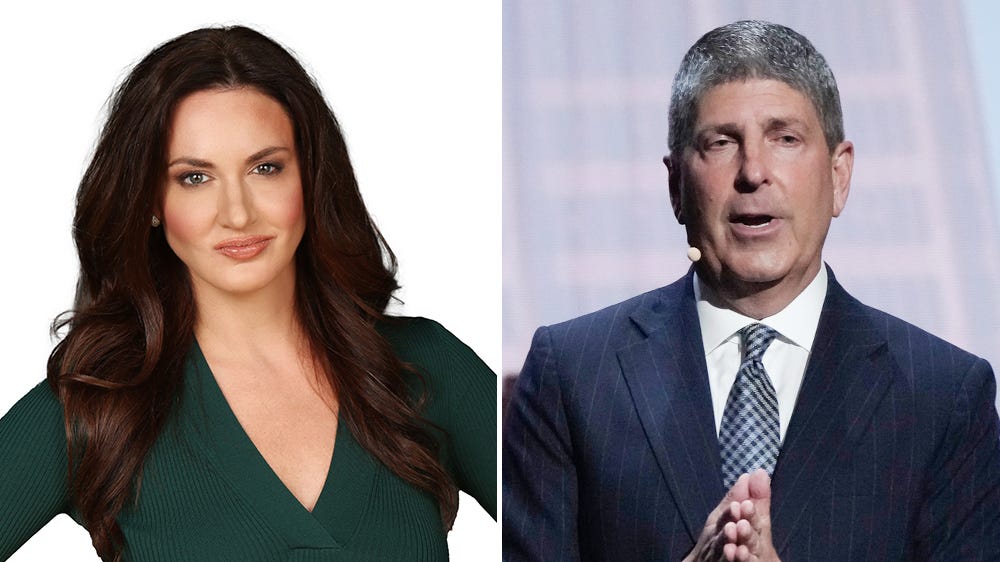And another man gone, and another man gone
Accusations of sexism mean that even the most (allegedly) powerful men must fear offending women
Last month, three men in media lost high-profile positions over a single weekend: on April 23rd and 24th, it was announced that Jeff Shell was out at NBCUniversal, Don Lemon at CNN, and Tucker Carlson at Fox. The reasons for Lemon’s and Carlson’s dismissals have not been released, but transgressions against gender propriety seem to have played a role in all three. Even a glance at their stories highlights the vulnerability of all men today to complaints of sexism—and the relish with which accusing women pursue and applaud men’s professional destruction.
Only Jeff Shell, CEO of the media giant NBCUniversal, was fired for sexual misconduct; according to reports, his affair with a woman at the company (though not hers with him—more on this later) contravened the company’s “safe and respectful workplace” policies. TV personalities Don Lemon and Tucker Carlson, however, have also been in the news for their purported sexism: Lemon for having the temerity to say that women are not considered to be “in their prime” after their 20s, 30s, and possibly 40s, a statement that caused outrage to various female pundits and politicians (with opinion-maker Megyn Kelly beside herself with annoyance); and Carlson for alleged sexist misdemeanors, including referring to a female guest by an offensive epithet, displaying a photoshopped picture of a buxom, swim-suited Nancy Pelosi in his Fox production office, and polling staffers on which candidate for Michigan governor was sexiest.
None of the above seem (at least to my leathery sensibilities) anywhere close to firing offences, or even to be newsworthy at a time when crude language and sexual adventures are taken-for-granted markers of freedom. But that hasn’t stopped naysayers—the vast majority women—from expressing satisfaction, even jubilation, at the men’s punishments.
For Megyn Kelly, Lemon’s termination was the answer to her repeated demand that “women’s offence” be recognized (see her aggressive feminist rant here). Republican presidential candidate Nikki Haley was even more gleeful, tweeting that Lemon’s firing was a “great day for women everywhere,” with an image of two cans of lemonade with captions saying “Past My Prime?” and “Hold My Beer.”
The arrogance of Haley’s statement—with its assumption that every woman is as sensitive as she to the perceived slight—is as tiresome as the undisguised schadenfreude. She followed this up with “Now let’s get men out of women’s sports,” suggesting that getting men like Lemon out of media was a legitimate pro-feminist political objective.
Reaction to Carlson’s firing had similar self-congratulatory feminist overtones. Amidst what Rolling Stone claimed was “pure joy” by Fox staffers generally, a disgruntled former employee, Abby Grossberg, who is suing Fox network over sexism, went even further than Haley by proclaiming Carlson’s firing to be “great for America!” The fact that millions of Americans were shocked and disappointed by what seemed an act of state censorship did not dampen her conviction. She too was focused on the particular injuries he had caused not only as a bad American but as a bad man, claiming that the firing was a “step towards accountability […] for the abuse and harassment” (the Pelosi poster and so on) allegedly rife at Carlson’s show. Congresswoman Alexandria Ocasio-Cortez joined in the celebration, saying that Carlson’s firing “couldn’t have happened to a better guy” because of his “vicious targeting [of] women, people of color, and the LGBTQ+ community.” Her message was clear: anyone who offends women (or other favored constituencies) deserves dismissal.
The many purges of the past years suggest that no man is too valuable to be jettisoned and that few escape career-damaging sexism allegations. As Politico reported back in 2020, Carlson was one of many high-profile Fox associates to be dogged by civil suits and complaints. For Politico, the sheer number of accused men seemed to confirm the complaints’ legitimacy, though it more likely shows the risk-free ease with which complaints can be made. According to Politico, a single reporter, Cathy Areu, had accused four Fox hosts, including Sean Hannity and Carlson, of “sexual harassment and gender discrimination.” Host Ed Henry was fired following assault and harassment allegations by former producer Jennifer Eckhart. Former Fox CEO and Chairman Roger Ailes resigned in 2016 amidst allegations of sexual misconduct (and died the following year), while Bill O’Reilly, whose popular 8 pm slot had been taken over by Carlson, had also been forced from his position by women’s complaints. More recently, Carlson’s executive producer Justin Wells, named in the Grossberg lawsuit, was also fired. And Fox is by no means unusual in this regard.
To read about Jeff Shell’s termination is to enter the murky world of feminist-compliant evasion and indirection. A substantial article in Variety magazine reports that Shell was dismissed “with cause” over allegations by Hadley Gamble, a CNBC news anchor stationed in Abu Dhabi. (One of Gamble’s most famous moments was a flirtatious interview with pre-invasion Vladimir Putin, which caused many news outlets to charge Putin with sexism for criticizing what he saw as Gamble’s deliberate misinterpretations of his answers.) Investigation into emails between Shell and Gamble apparently “corroborated the [harassment] allegations,” thus sealing Shell’s fate. The Variety story notes that Shell “joined a recent list of studio chiefs felled by sexual misconduct allegations, including Leslie Moonves, Kevin Tsujihara and Ron Meyer, the latter fired by Shell himself at a time when he was allegedly carrying on with Gamble.”
Wait. Was Shell “carrying on with Gamble” or was he preying sexually on an unwilling colleague? The phrasing is deliberately ambiguous. Though an unnamed source is reported to be “disgusted by Shell’s double standard [in firing others for what he was doing] and astonished by his lack of judgement,” no one mentions the evident double standard at the heart of his case. Shell’s “harassment” of Gamble was, as far as can be discerned from the article, a near-decade-long consensual affair that ran from 2012 to 2021, during which long period Gamble registered not a word of objection to company bosses. It was only after Gamble learned that her contract with the network would not be renewed (a contract over which Shell had no influence) that she “lodged a complaint naming Shell”—as if determined to take him down while garnering for herself a lucrative settlement package. The inequitable result is glaring: the man is fired and financially penalized (Shell will lose over 43 million dollars in stock options), while the woman is protected and financially compensated. Lest anyone be tempted to pity Shell, the article reminds us that he also fired NBC news host Matt Lauer and former Universal marketing head Josh Goldstine (later compensated for wrongful dismissal) over alleged sexual harassment.
At least two things are striking in all of this. Not least is the wide spectrum of styles of sexual misconduct, which range from the simply crude to the traditionally immoral, from the commonplace to the romantic—and everything in between. These are, of course, gendered crimes, in that it is almost exclusively men who can be found guilty of them. More serious, perhaps is how normal the disappearing acts have become, how easily our notions of natural justice or equality before the law have been set aside. Gay or straight, black or white, young or old, conservative or progressive, any man can be taken down.
It is now part of the cost of doing business for companies to dismiss men in response to credible (i.e. not manifestly preposterous) allegations. Companies do so to avoid liability, knowing they can be sued if they fail to act promptly. In How to Destroy A Man Now (DAMN): A Handbook (highly recommended), the pseudonymous author provides a partial list of prominent men in the media, political, and entertainment worlds taken out in the Fall, 2017 lightning purge, the official kickoff to the MeToo movement. They were pundits, politicians, comedians, actors, fashion photographers, directors, producers, and celebrity chefs, almost all disgraced and sacked through accusation alone, without any criminal investigation or trial. In the years since then, no one has attempted an accounting of all the men “damned” in this manner.
Feminist ideologues pushed sexual harassment policies by saying that they were about equality, the right to work without fear or coercion. But in practice, the policies created fear and coercion for men, and have had nothing to do with equality, as shown by the fact that accused female harassers tend to be treated far more leniently than are male accused, while women’s sexual power (in everything from provocative dress or undress, to the ability to initiate sexual relationships without reprisal) is left unacknowledged. In the case of Shell, for example, his accuser’s attorney expressed indignation that her “client’s name has been released and her privacy violated.” Merely by revealing a sexual affair in which she seems to have been a full participant, the accuser secures her status as an injured innocent whose job security and even privacy become sacrosanct. It goes without saying that sexual harassment legislation has made it extremely difficult for companies to fire women without opening themselves to allegations of sexism.
Whatever real problem sexual harassment legislation may once have been designed to address (Stephen Baskerville, in The New Politics of Sex, argues that already-existing legal and civil prohibitions on assault, blackmail, lewdness, etc. were sufficient to cover the abuses feminists described [p. 157]), the power to destroy a man’s reputation and career has proved irresistible to a considerable number of women. Not all women, of course, are interested in wielding victim-power to retaliate for an ill-advised flirtation or illicit affair, but every woman today knows she has that power. As in the case of a loaded gun that only one party can use with impunity, the convenience of a sexism allegation will inevitably be widely abused. Jeff Shell, Don Lemon, and Tucker Carlson are wealthy, well-connected men who can land, if bruised, on their feet; but many other men, without privilege, savings, or connections, will spend years reflecting on the unintended offence or outright lie that deprived them of their good name and livelihood.
It seems unlikely that sexual harassment legislation—saturated with feminist assumptions about male power and predatory sexuality—can ever be reformed. It needs to be dismantled altogether, leaving men and women to work out their conflicts and relationships like mature adults. Feminists long assured us that this was all their movement demanded.





So grateful for your essays, Janice.
Here's how bad it is. I'm a gay guy. Everyone knows this. Few would mistake me for a straight guy.
Yet, just yesterday, and this is certainly not the first time, a feminist accused me of want to rape women and/or find ways to sexually degrade them.
Male, homosexual, friends of mine who are psychotherapists (two in total) refuse to take women clients. Because that would require being in a closed door room with a woman with no witnesses.
Of course, this can only mean that I, and my friends, are liars, or crazy.
I can't speak to the other two, but in the case of Carlson I strongly suspect the sexism allegations to have been a convenient fig leaf. He's been a thorn in the establishment's side for years now, and has been cutting deeper as time went on. One way or the other they needed to get rid of him.